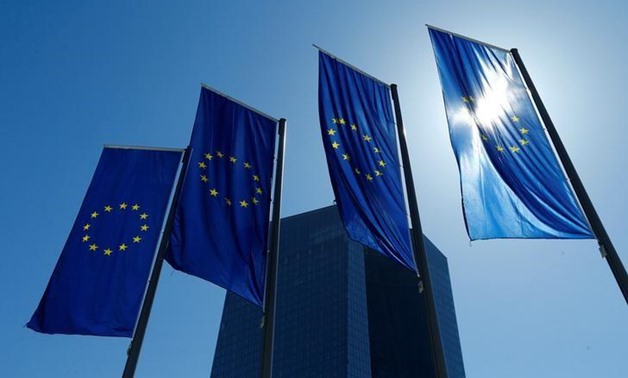
FILE PHOTO: European Union flags flutter outside the headquarters of the European Central Bank (ECB) in Frankfurt, Germany, April 21, 2016. REUTERS/Ralph Orlowski/File Photo
CAIRO – 12 December 2018: The European Commission issued a report covering the European Union-Egypt Partnership,highlighting the major developments in their cooperation with a particular focus on achieving the goals set within the framework of the partnership priorities 2017-2020.
The report of the European Commission covers the EU-Egypt partnership from June 2017 to May 2018 and assesses the economic, political and social developments in Egypt, focusing on priority areas.
The report said that Egypt has been implementing an ambitious economic reform plan since mid-2016, backed by the International Monetary Fund (IMF) through a loan of $12 billion,torestore macroeconomic stability and boost growth, which have been severely hit after the events of 2011.
The report praised Egypt's key measures to achieve macroeconomic stability and restore competitiveness such as floating the currency in November 2016, raising interest rates to contain inflation, reforming the subsidy program and introducing VAT at 14 percent, in addition to a number of structural reforms in the business enabling environment.
The report pointed out that the flotation of the Egyptian pound led to a decline in its value by more than 50 percent, which raised the cost of unsupported imports, levels of inflation and thus increased the cost of living. However, the enhancement of social protection measures and the increased food support came to ease the pressures of higher living costs, especially on vulnerable segments of the population.
“Inflation fell to 11.4 percent in May 2018, after reaching its peak in July 2017 at 32.5 percent,” the report stated, adding that for the first time since the exchange rate was floated, the central bank cut interest rates in February and again in March 2018.
The report pointed out that although the macroeconomic stability is still at an early stage, the country started to recover during the report's period. “GDP in fiscal year 2016/17 grew by 4.2 percent and hiked to 5.3 percent in fiscal year 2017/18."
It referred that unemployment rates also fell positively from 11.3 percent at the end of FY2016 to 9.9 percent at the end of fiscal year 2017/18.
The report also highlighted the strengthening of the oil extraction sector, especially after the discovery of the Zohr gas field, and the start of its operation in December 2017. “Indeed, the improvement in energy supply has begun to affect the other sectors, especially the manufacturing sector.”
As per the tourism sector, the report stated that the sector strongly recovered during the first half of fiscal year 2017/2018, as it marked an increase of 44.5 percent driven by the devaluation of the currency and the resumption of Russian flights to Egypt after a two-year suspension.
The total number of tourists in 2017 was 8.3 million tourists, compared to 5.4 million the prior year. European tourists accounted for 57 percent of all arrivals in 2017, with Germany coming at the top of the list.
The report stated that although the current account deficit hasn’t changed due to currency devaluation, it is expected to fall by 2.8 percent in fiscal year 2017/18 thanks to the production of the new gas fields,which will replace imports and tourism.
The report noted that foreign reserves reached a new record high of $44.1 billion at the end of May 2018.
It also pointed to the improvement in the overall financial situation, reaching an initial financial surplus of 0.2 percent in fiscal year 2017/18.
Trade and Investment
The report said that the EU remains Egypt's largest trading partner for imports and exports, accounting for 29.7 percent of Egypt's trade volume in 2017.
“During that year, trade between the EU and Egypt peaked at €27.9 billion (compared with €11.8 billion in 2004, when the partnership Agreement entered into force).
Egypt's exports to the EU increased by 20.8 percent in 2017, with agricultural and food exports increasing by 10.5 percent, while EU exports to Egypt fell 3.8 percent, which resulted in a15.4 percent decline of trade deficit between the two sides to €11.75 billion.
According to the report, the EU remains the largest investor in Egypt, with investments of EU member countries amounting to €42.8 billion. It also said that the new investment law, adopted in May 2017, seeks to overcome existing challenges, including bureaucracy,through the promotion of foreign investment by offering more incentives, as well as simpler and more efficient operations.
Foreign direct investment (FDI) remains concentrated in the oil and gas sector, with the increasing renewable energy (wind and solar). According to the Central Bank of Egypt's (CBE) data, the total foreign direct investment flows from the EU are increasing, reaching $8.863 billion in 2016/2017, up from US $ 7.876 billion in 2015/2016.


Comments
Leave a Comment